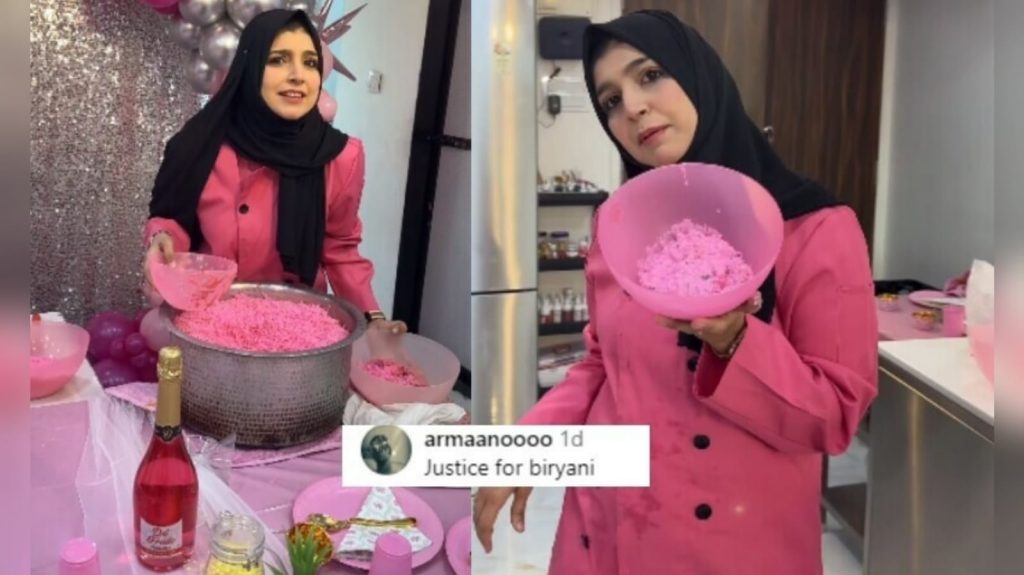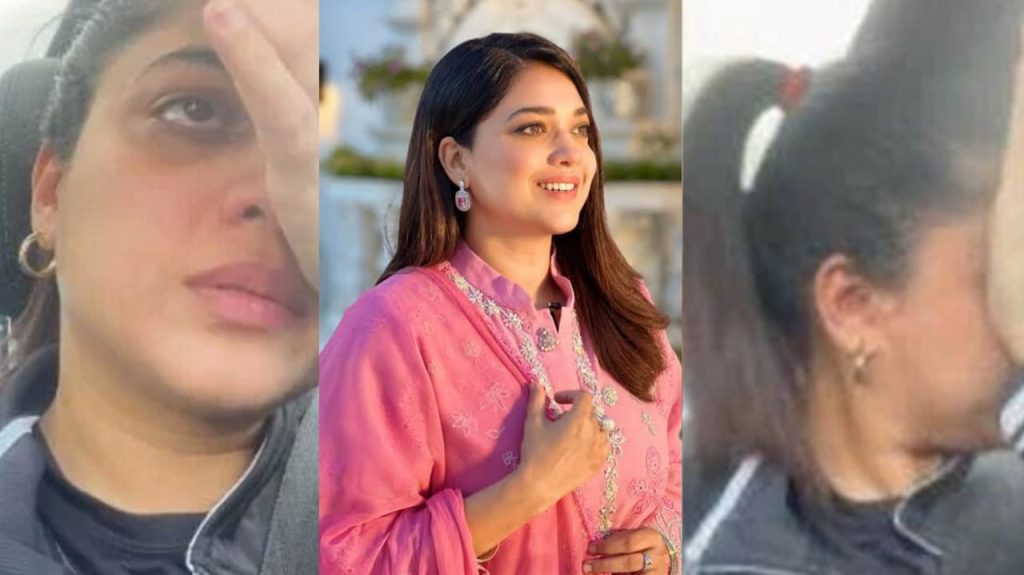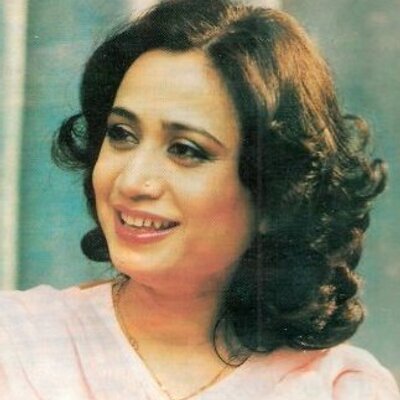


Introduction – Parveen Shakir
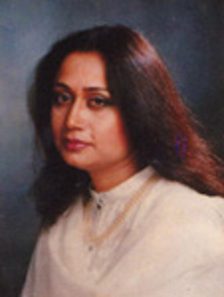

 Parveen Shakir was an Urdu poetess, educator and a municipal servant of the Government of Pakistan. She was born on 24 November 1952 in Karachi, Sindh, Pakistan. She began composing at an early age and spread her first volume of verse, Khushbu [Fragrance], to incredible recognition, in 1976. She in this way distributed different volumes of verse, all generally welcomed, Sad-barg [Marsh Marigold] in 1980, Khud Kalami [Talking To Oneself] and Inkaar [Denial] in 1990, Kaf-e-Aina [The Mirror’s Edge] other than an accumulation of her daily paper segments, named Gosha-e-Chashm [Corner of the Eye], and was granted one of Pakistan’s most noteworthy respects, the Pride of Performance for her extraordinary commitment to writing in 1976. The verse books are gathered in the volume Mah-e-Tamaam except for Kaf-e-Aina. Parveen passed away in 1994 in a car accident while on her approach to work.
Parveen Shakir was an Urdu poetess, educator and a municipal servant of the Government of Pakistan. She was born on 24 November 1952 in Karachi, Sindh, Pakistan. She began composing at an early age and spread her first volume of verse, Khushbu [Fragrance], to incredible recognition, in 1976. She in this way distributed different volumes of verse, all generally welcomed, Sad-barg [Marsh Marigold] in 1980, Khud Kalami [Talking To Oneself] and Inkaar [Denial] in 1990, Kaf-e-Aina [The Mirror’s Edge] other than an accumulation of her daily paper segments, named Gosha-e-Chashm [Corner of the Eye], and was granted one of Pakistan’s most noteworthy respects, the Pride of Performance for her extraordinary commitment to writing in 1976. The verse books are gathered in the volume Mah-e-Tamaam except for Kaf-e-Aina. Parveen passed away in 1994 in a car accident while on her approach to work.
Education
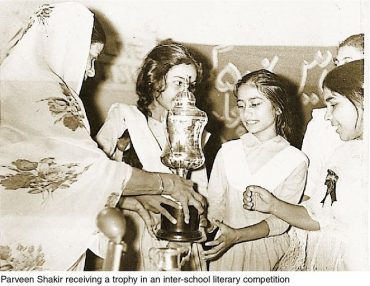

 Parveen Shakir did her matriculation in 1966, intermediate in 1968, B.A (Hons) in 1971 and M.A (English) from Karachi University in 1972. She showed up in CSS in 1982 and secured second position in Pakistan. Parveen Shakir acquired two graduate degrees, one in English Literature and the other one in Linguistics. She additionally held a few degrees and another graduate degree in Bank Administration. She was an instructor for a long time before she joined the Civil Service and functioned in the Customs Department. In 1986 she was delegated as the second secretary, Federal Bureau of Revenue in Islamabad. A remarkable understudy all through, Parveen taught English writing for a long time at Abdullah College in Karachi before joining the civil administrations. In the course of her administration service, she received studentships and chased studies in the West.
Parveen Shakir did her matriculation in 1966, intermediate in 1968, B.A (Hons) in 1971 and M.A (English) from Karachi University in 1972. She showed up in CSS in 1982 and secured second position in Pakistan. Parveen Shakir acquired two graduate degrees, one in English Literature and the other one in Linguistics. She additionally held a few degrees and another graduate degree in Bank Administration. She was an instructor for a long time before she joined the Civil Service and functioned in the Customs Department. In 1986 she was delegated as the second secretary, Federal Bureau of Revenue in Islamabad. A remarkable understudy all through, Parveen taught English writing for a long time at Abdullah College in Karachi before joining the civil administrations. In the course of her administration service, she received studentships and chased studies in the West.
Beginning of Career
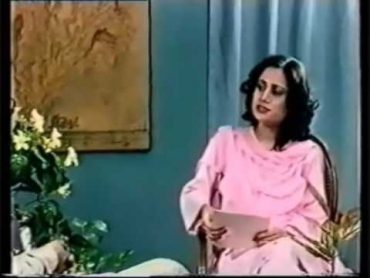

 Parveen began composing at a youthful age, writing both composition and verse, and donating segments in Urdu daily papers, and a couple of blogs in English magazines. At first, she composed under the pseudonym, “Beena”. Parveen Shakir utilized dual types of poesy in her work generally, one being the customary ghazal and the other as free rhyme. The utmost noticeable subjects in Parveen’s poesy are affection, feminism, and social humiliations,however she infrequently composed on different points too.
Parveen began composing at a youthful age, writing both composition and verse, and donating segments in Urdu daily papers, and a couple of blogs in English magazines. At first, she composed under the pseudonym, “Beena”. Parveen Shakir utilized dual types of poesy in her work generally, one being the customary ghazal and the other as free rhyme. The utmost noticeable subjects in Parveen’s poesy are affection, feminism, and social humiliations,however she infrequently composed on different points too.
Her work was frequently in light of romance, discovering the ideas of adoration, attractiveness and their flaws, and comprehensively combined the usage of comparisons, allegories and characterizations. Ostensibly, Parveen can be named as the principal lady writer to utilize the word ‘girl’ in her workings as the male-ruled Urdu verse act sometimes utilizes that word, and uses manly linguistic structure while discussing the beloved one. Correspondingly, she regularly made utilization of the Urdu first-individual, ladylike pronoun in her verses which, however to a great degree basic in composition, was once in a while utilized as a part of verse, even by female artists, afore her.
Parveen Shakir Poetry
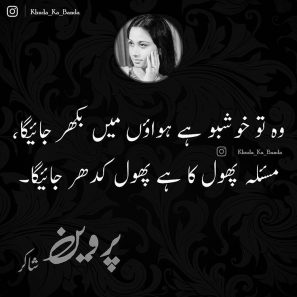

 Parveen Shakir’s ghazalyaat are viewed as “a mix of established convention with present day thoughtfulness”, and primarily manage the ladylike point of view on affection and sentiment, and related subjects, for example, attractiveness, closeness, parting, terminations, spaces, doubts and unfaithfulness and betrayal. A large portion of Parveen’s ghazalyaat comprise five to ten odes, Here and there, two back to back couplets may contrast incredibly in significance and setting, for case, in one of her works, the couplet ‘That young lady, similar to her home, maybe/Fell casualty to the surge is quickly trailed by ‘I see light when I consider you/Perhaps recognition has turned into the moon’.
Parveen Shakir’s ghazalyaat are viewed as “a mix of established convention with present day thoughtfulness”, and primarily manage the ladylike point of view on affection and sentiment, and related subjects, for example, attractiveness, closeness, parting, terminations, spaces, doubts and unfaithfulness and betrayal. A large portion of Parveen’s ghazalyaat comprise five to ten odes, Here and there, two back to back couplets may contrast incredibly in significance and setting, for case, in one of her works, the couplet ‘That young lady, similar to her home, maybe/Fell casualty to the surge is quickly trailed by ‘I see light when I consider you/Perhaps recognition has turned into the moon’.
Her ghazalyaat vigorously depend on illustrations and analogies, which are more than once and suspected provocatively used to get strength and lyricism in her work. A fine case of this is found in one of her most well-known verses, “Wo tou khushbu hai, hawaon mein bikhar jayega, Masla phool ka hai, phool kidher jayega?” (He is fragrance and would breeze in the air /the inconvenience lies with the bloom – where might the blossom go?),where she narrates “fragrance” to a disloyal lover,’air’ to the traitorous being’s secret loves, and ‘flower’ to the individual being betrayed. The other allegories, she frequently uses are titli [butterfly] for a Romeo, badal [cloud] for one’s affection, baarish [rain] for liking, and andhi [storm] for complications and worries. Some of her ghazalyaat or, more precisely, verses, have increased an iconic position in Urdu literature. One of her most well-known verses if the one specified above. Another renowned sonnet is “Jugnu ko din kay waqt parakhne ki zid karain, Bachchay hamaray ehed kay chalaak ho gaye” (They contend upon catching the firefly in daytime/ the youngsters of our age, have developed cleverer), which is every so often mentioned to remark on the often astonishing familiarity and wakefulness of the 21st century child.
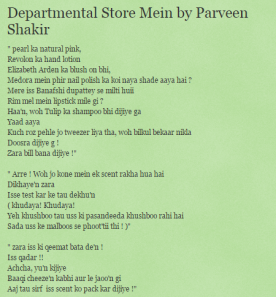

 When contrasted with her ghazalyaat Shakir’s free verse is much valiant, and discovers societal matters and prohibitions, including sexual category, parting, nationalism, hypocritical, prostitution, the human thoughts, and present activities. It is additionally much more current and informed. Parveen Shakir is recognized for having utilized the use of popular ethos orientations and English words and expressions, that have stirred up with Urdu, in her free verse, a preparation that is both by and large viewed as wrong, and condemned, in Urdu verse. A case is the ballad Departmental Store Mein [In a Departmental Store], which is titled along these lines notwithstanding the way that there the term ‘departmental store’ could undoubtedly have been replaced with its Urdu proportional, and where terms like ‘natural pink,’ ‘hand moisturizer,’ “shade,” “aroma” and “pack” are brought into utilization, and mentions made to beauty care products brands like, Pearl, Revlon, Elizabeth Arden, and Tulip. Other cases are her ballads Ecstasy, Nun and Picnic. Parveen’s free verse additionally holds a couple of attributed interpreted or enlivened works that are ballads that are interpretations of, or enlivened by, different writers. Instances are Wasteland, a lyric roused by Elliot’s ballad of a similar name, and Benasab Wirsay Ka Bojh [The Burden of Illegitimate Inheritance], an interpretation of W.B. Yeats’ Leda and the Swan.
When contrasted with her ghazalyaat Shakir’s free verse is much valiant, and discovers societal matters and prohibitions, including sexual category, parting, nationalism, hypocritical, prostitution, the human thoughts, and present activities. It is additionally much more current and informed. Parveen Shakir is recognized for having utilized the use of popular ethos orientations and English words and expressions, that have stirred up with Urdu, in her free verse, a preparation that is both by and large viewed as wrong, and condemned, in Urdu verse. A case is the ballad Departmental Store Mein [In a Departmental Store], which is titled along these lines notwithstanding the way that there the term ‘departmental store’ could undoubtedly have been replaced with its Urdu proportional, and where terms like ‘natural pink,’ ‘hand moisturizer,’ “shade,” “aroma” and “pack” are brought into utilization, and mentions made to beauty care products brands like, Pearl, Revlon, Elizabeth Arden, and Tulip. Other cases are her ballads Ecstasy, Nun and Picnic. Parveen’s free verse additionally holds a couple of attributed interpreted or enlivened works that are ballads that are interpretations of, or enlivened by, different writers. Instances are Wasteland, a lyric roused by Elliot’s ballad of a similar name, and Benasab Wirsay Ka Bojh [The Burden of Illegitimate Inheritance], an interpretation of W.B. Yeats’ Leda and the Swan.
7 Things You Might Not Know About Parveen Shakir
‘Khushbu’
Khusbhu is a volume of verse composed by Pakistani artist and feature writer Parveen Shakir, and distributed in 1976.
The ghazalyaat in Parveen’s books are one of the greatest, acknowledged sources to her character, and those in Khushbu set up her as an enthusiastic, sentimental, blazing and, most importantly, solid lady. In one verse, Parveen depicts her searing nature, and assurance to secure what she cherishes. She additionally communicates her relentlessness in adoration “Is there anybody like me, who/will commit their life to thy recognition?” and “Where have I not gone looking for tranquility of heart/But rather this heart – Forever it has been in his amity!” Her assurance to gain from intense experience, and to proceed onward in life, “I proceeded onward, for thy disloyalty/Revealed to me this weary world”, and the way that she doesn’t wear her feelings on her sleeve “It has broken, yet welcomes with grin/I am in control of my disposition”. The ghazalyaat in Khushbu deliver Parveen’s hunger for attempting new things, “I should leave the street/the way to my home is not cleared”, her steadfast feeling of truth over falsehoods, “Your truths were harsh, yet I like them”,and “I will talk reality no matter what, I did not know/You did not know about this malevolence of mine!”,and her propensity for encountering each feeling strongly, “I have been outstanding to the way of tempests”.
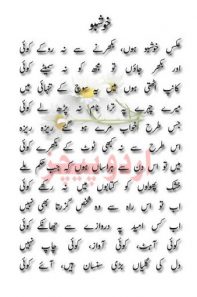

 Partition is a highly stressed theme in Khushbu, and is managed from various perspectives. It might agreeable or disinclined detachment, such as separations, long distance affairs, failing love or recollections of an old sentiment, and is accentuated in works, for example, “Neend tou khwaab hai aur hijr ki shub khwaab kahan?” (Sleep is a fantasy – and the night of partition is not a fantasy!),”Dost, Shadeed dukh tha aga cha teri judaaika” (Though the hurt of your detachment was excessive!)and “Chiraagh-e-raah bujha kya, kay rehnuma bhi gaya” (The guide left when the light ceased to exist). Additionally Parveen’s work “Let Him Come to Sprout a Flower in my Heart” vigorously concentrates on these topics. Like “Give him a chance to come to grow a blossom in my heart, Let him come to wound my heart once more! Give scent a chance to alert in my unfilled entryways, Let him come to enrich my home. Around here, live many individuals he knows, Cannot he go under the affectation of meeting another person?”In The Night Dances Like my Body, Parveen says, “I will carry on with my life, far from you, like an outcast.”Thus, partition that is unwilling on both sides is inferred by the accompanying verses in her ghazal “My face – his eyes!” she says, “Regularly, I wake up from my rest, considering, How can he hold up under the night? Regardless of every one of these separations, his arms, enclose me, until the end of time.”
Partition is a highly stressed theme in Khushbu, and is managed from various perspectives. It might agreeable or disinclined detachment, such as separations, long distance affairs, failing love or recollections of an old sentiment, and is accentuated in works, for example, “Neend tou khwaab hai aur hijr ki shub khwaab kahan?” (Sleep is a fantasy – and the night of partition is not a fantasy!),”Dost, Shadeed dukh tha aga cha teri judaaika” (Though the hurt of your detachment was excessive!)and “Chiraagh-e-raah bujha kya, kay rehnuma bhi gaya” (The guide left when the light ceased to exist). Additionally Parveen’s work “Let Him Come to Sprout a Flower in my Heart” vigorously concentrates on these topics. Like “Give him a chance to come to grow a blossom in my heart, Let him come to wound my heart once more! Give scent a chance to alert in my unfilled entryways, Let him come to enrich my home. Around here, live many individuals he knows, Cannot he go under the affectation of meeting another person?”In The Night Dances Like my Body, Parveen says, “I will carry on with my life, far from you, like an outcast.”Thus, partition that is unwilling on both sides is inferred by the accompanying verses in her ghazal “My face – his eyes!” she says, “Regularly, I wake up from my rest, considering, How can he hold up under the night? Regardless of every one of these separations, his arms, enclose me, until the end of time.”
The theme of the willful love is raised on numerous occasions in ghazalyaat, for example, “Wo tou khushbu hai, (He is scent) Khushbu bhi us k tarz-e-pazeerai per gai (Fragrance’s treatment resembles his welcome), Gongay laboun pe hurf-e-tamanna kiya mujhe” (I am a desire of mute lips). Her verse frequently discusses hurt, its agony and its delight. It likewise frequently says misfortune and forlornness, pain, smashed dreams, life after a separation and the recuperating influence of affection.
Honors
Parveen Shakir’s verse was generally welcomed, and after her awkward demise, she is presently viewed as one of the best and “most noticeable” advanced artists of the Urdu dialect has ever delivered. Addressed as an “extraordinary poetess,”her verse has attracted correlations with that of Iranian poet Forough Farrokhzad, and she is deliberated among the type of poets“observed as innovators in resisting custom by communicating the “female experience” in Urdu verse.”
A source states, “Parveen appears to have caught the best of Urdu verse.Outstanding to her style and variety of terminologies, one will be fascinated and amused by some soul-stirring poetry. An additional admirations “her rhythmic drift and refined phrasing”.
Legendary character Iftikhar Arif has lauded Shakir for influencing “the youthful portion by her thematic range and genuine poetry,”for including “another measurement to the customary topic of adoration by offering expression to her feelings in a straightforward and clear style,”and utilizing an “assortment of words to pass on various musings with shifting powers.She additionally contributed daily paper segments. Her verse capably and disobediently voiced the profoundly stifled feelings of ladies living in a general public ruled by men and their restrictions. The Delhi Recorder has expressed that Shakir has given the most excellent female touch to Urdu verse. Her first book, Khushbu, was granted the Adamjee Award in 1976. After that, she was granted the Pride of Performance, one of Pakistan’s most noteworthy respects in 1976. Upon her demise, the Parveen Shakir Trust was built up by her dear companion, Parveen Qadir Agha. The Parveen Shakir Trust sorts out a yearly occasion and gives out the “Aks-e-Khushbu” grant. In 2013, Pakistan Post Office distributed a dedicatory postage imprint of Rupees 10 currency on Parveen Shakir’s death centenary.
Personal Life
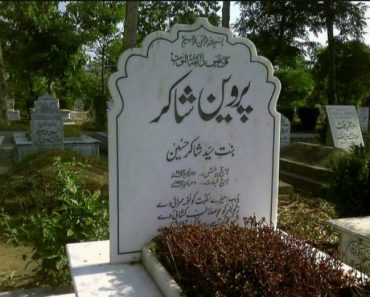

 Parveen Shakir wedded a Pakistani doctor, Syed Naseer Ali, with whom she had a child, Syed Murad Ali. Unfortunately the marriage did not keep going long and finished in a divorce. On 26 December 1994, Parveen’s car hit with a bus when she was on her way to work in Islamabad. The mishap leads to her decease, an extraordinary misfortune to the Urdu verse world. The street on which the mischance occurred is named after her now (ParveenShakir Road). At the season of her demise, she was just 42 years of age and her sudden passing was an extraordinary stun to her fans.
Parveen Shakir wedded a Pakistani doctor, Syed Naseer Ali, with whom she had a child, Syed Murad Ali. Unfortunately the marriage did not keep going long and finished in a divorce. On 26 December 1994, Parveen’s car hit with a bus when she was on her way to work in Islamabad. The mishap leads to her decease, an extraordinary misfortune to the Urdu verse world. The street on which the mischance occurred is named after her now (ParveenShakir Road). At the season of her demise, she was just 42 years of age and her sudden passing was an extraordinary stun to her fans.
The separation of Parveen’s marriage left her spinning. Her child Murad, nicknamed Geetu, turned into the focal point of her reality. Also, being a solitary working mother and contending skillfully and socially in a frightening masculine atmosphere additionally exacerbated her thoughtfulness concerning gender matters facing women.








